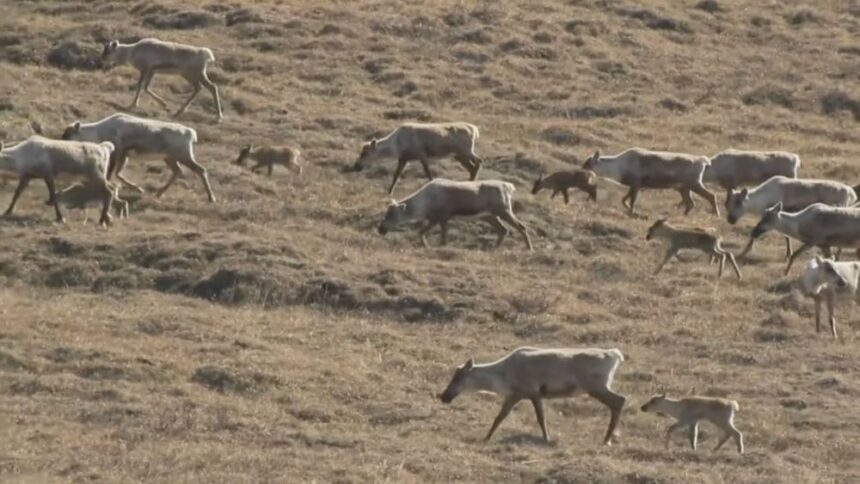Indigenous groups and conservationists are weighing in on U.S. President Donald Trump’s budget reconciliation bill which gives the legal green light for oil and gas drilling within the Arctic National Wildlife Refuge. “We don’t take this lightly at all. This is our way of life,” Kristen Moreland, executive director of the Gwich’in Steering Committee told APTN News. The committee advocates for the protection of the Porcupine caribou herd. “No amount of money can justify what is taking place.” The controversial bill passed through the House of Representatives in June and barely made it through the Senate before it was signed into law by Trump during on July 4. Along with cuts to Medicaid and food assistance, the bill provides generous tax cuts for the wealthy and seeks to raise revenue by auctioning off public land in Alaska and other states. Within the bill’s grasp is the Arctic National Wildlife Refuge, or ANWR, located in northeast Alaska. The 19-million-acre refuge is considered one of the last few wild places on earth and is home to polar bears, wolves and countless other Arctic wildlife. The crown jewel of the refuge is its 1.5-million-acre coastal plain, which borders the Beaufort Sea. The plain serves as birthing and nursery grounds for the Porcupine caribou, a traditional and nutritional food source for the Gwich’in people in Alaska and northern Canada. The bill stipulates four oil and gas lease sales within the refuge must take place over the next ten years, with no less than 400,000 acres of land offered with each sale. The bill likewise demands that the first sale must take place within a year of the bill being signed. The state of Alaska is also positioned to earn big from the lease sales. The state is set to receive 50 per cent of the sales’ profits from now until 2033, which will shoot up to 70 per cent after 2034. But Moreland said the bill is a slap in the fact to the Gwich’in who consider the plain to be sacred and worry any industrial disturbance could have drastic impacts on the caribou. “That’s who we are. We’re caribou people,” Moreland said. “Our traditional knowledge tells us that if you develop in the nursery grounds of the caribou, you destroy the caribou, and therefore destroy the Gwich’in.” Bill anything but beautiful, says conservation group The Gwich’in’s concerns are echoed by an Alaskan conservation group that opposes development in Alaska’s remaining untouched lands. “The bill that passed on July 4th was a very bad bill for very many reasons,” said Kristen Miller, executive director of the Alaska Wilderness League, a non-profit focused on protecting the state’s landscape from industrial threats. “For us, it is most concerning because it sells off and mandates even more lease sales for the 1.5 million-acre coastal plain of the Arctic National Wildlife Refuge, which is the biological heart of this incredible landscape in Alaska.” She said the refuge has technically been open to development since 2017 when the first Trump administration introduced an earlier version of the bill. “This truly isn’t new money and it isn’t a budget solution to pay off for tax cuts for the wealthy,” she said. But Trump, who has long touted the refuge as a source of economic opportunity, isn’t deterred. His penchant to “drill, baby, drill” culminated in two federally mandated lease sales that took place under in 2021 and earlier this year. While the sales generated virtually no industry interest, at least one corporation is now eyeing the refuge’s economic potential. The Alaska Industrial Development and Export Authority (AIDEA), a state-owned development agency, is the only entity currently holding leases in the refuge. The corporation placed bids during the 2021 lease sale, which were later scrapped by the Biden administration. However, a federal court ruling earlier this year found the Biden administration didn’t have the authority to cancel the leases without a court order. The company’s seven leases covering more than 360,000 acres have since been reinstated. But Miller said AIDEA faces an uphill battle. She said the company is being propped up by the state’s budget, leaving it with few financial resources to develop leases on its own. She said there are other issues, too. “Any lease sales that happen outside of that are going to be leases that are outside of the zone of interest for any oil company. So, I don’t know that there will be any interest from the oil industry in leasing more of the refuge,” she said. “It’s a difficult place to develop…And I think there is a question about whether it makes economical sense to even develop the leases that are held right now.” Iñupiat organization welcomes bill, praises economic benefits Meanwhile, for the Iñupiat living on Alaska’s North Slope where oil and gas drilling can unlock economic benefits, the bill is being well received. “I think overall, it’s good, right?” said Nagruk Harcharek, president of the Voice of the Arctic Iñupiat (VOICE), a non-profit representing North Slope communities. Harcharek said the North Slope borough has the ability to tax infrastructure developed on the North Slope, which is reinvested back into its communities. That revenue helps pay for things like schools, hospitals and roads. He said not only will North Slope communities benefit from development within the ANWR, but also the National Petroleum Reserve (NPR), which is likewise mentioned in the bill. Harcharek said the Iñupiat are advocating for safe, responsible development that upholds environmental standards. “A lot of the advocacy that we’ve done over the last couple of years surrounding the NPR and ANWR is finally moving (in the right direction),” he said. “It seems like we’re finally making progress with respect to this bill being signed.” Despite the lack of interest in previous lease sales, Harcharek said VOICE isn’t discouraged. “There was a lot of risk associated with that considering the (Biden) administration, their stance towards any sort of development,” he said. “I think with the new administration, the new lease sales that they’ve included in this reconciliation (bill), it will hopefully reduce the amount of risk that folks feel like they’re taking, and they’ll be a bit more comfortable to bid on those things given the little bit longer window.” Gwich’in continue fight to protect refuge As for the Gwich’in, a lot is at stake. Moreland said her people are already struggling with dwindling numbers of chinook salmon in the Yukon river. That loss, she said, is impacting younger generations that are losing their connection to the salmon, and ultimately, their connection to their culture. “We want to continue to live our traditional ways. So, we’ll just keep going at every angle that comes at us,” she said. “Caribou are not just a species to us Gwich’in people, they are central to our identity, our culture, and our food security. Its our survival. It’s not a metaphor – it’s our reality.” Tags: AIDEA, Alaska Industrial Development and Export Authority, ANWR, Arctic National Wildlife Refuge, Caribou, Donald Trump, drilling, Gwich’in, Iñupiat, lease, One Big Beautiful Bill Continue Reading
We dont take this lightly: Trumps Big Beautiful Bill reopens drilling in Arctic refuge

Leave a Comment









